The Ipcress File (1965)
"I'm going to cook you the best meal you've ever eaten..."
Colonel Ross: Champignons? You’re paying ten pence more for a fancy French label. If you want button mushrooms they’re better value on the next shelf.
Harry Palmer: It’s not just the label sir, these do have better flavour.
Colonel Ross (sarcastically): Of course, you’re quite the gourmet, aren’t you Palmer?
The Ipcress File (1965)
If Harry Palmer, the cockney protagonist of The Ipcress File (1965), is the antithesis of Bond, then the London of The Ipcress File is the antithesis of All Things Swinging. Which just goes to show how perceived realities depend on interpretation. Historians, scientists, and writers like to tidy things away in boxes. I mean, somebody writing a novel of 1960s London might set it amongst Chelsea’s fashionable glitterati, of Alexander Plunkett-Greene’s basement restaurant in the King’s Road, of Christopher Gibbs’ antiquarian flat on Cheyne Walk, or amongst the mini-skirts of Mary Quant and the drophead Rolls-Royce of Blow-Up (1968), or even the Little Venice of Georgy Girl (1966) or the aspirational Smashing Time (1967). Or amongst the Mayfair Set: chemmy at The Clermont Club and dancing to the latest high-fidelity equipment at Annabel’s. Alternatively, such a novel might be set amongst the degradation of the slum landlord: Rachman and Notting Hell — the Kitchen Sink of Bryan Forbes’ The L Shaped Room (1962) or the Vespas and blue-rinse beehives of Up the Junction (1968). And sometimes, now again, the two worlds collide along Profumo lines.
Early in The Ipcress File (1965), Harry Palmer (Michael Caine) visits a stake-out in Hamilton Terrace, St John’s Wood, now the haunt of plutocrats and their trophy wives, but then a rat-infested, squalid dump. I kid you not. This is a London of soot, tea-bags and bomb sites. A world of bare floorboards, lightbulbs swinging from cracked ceilings, filing cabinets, desk lamps and mahogany; office Maureens with pursed lips and a dangling fag. London, in the early to mid 60s, was fuelled by the Mixed Grill and a Brown Windsor Soup. And into this culinary desert strides an egg-whisk bearing Harry Palmer, the perfect anti-hero (although Deighton denies it): vice-versa, a flawed Mister Bond. While Bond holds Her Majesty’s commission in the Senior Service, Palmer scrapes the rank of Sergeant in the Intelligence Corps. Bond wears a Walther PPK; Harry Palmer wears National Health Specs. And if queeny old Bond requires his housekeeper to boil the speckled brown egg of a Maran hen for three and a half minutes precisely, Harry Palmer slips Mozart’s Prague onto his trusty record player and whips up an Armagnac soufflé.
“You’re not the tearaway you think you are”, purrs sexy Sue Lloyd (star of Crossroads, The Baron, The Bitch and The Stud) during the kitchen scene in The Ipcress File, “You also like books… music… cooking.”
“I like birds best,” says Harry — an unsubtle reminder to a Sixties audience that although Sergeant Palmer appreciates the finer things in life, he bats, reassuringly, for the home side. At the time, Michael Caine’s character must have seemed remarkably novel, a prototypical yuppy before that depressing acronym had been invented, making it quite clear that it was okay for Real Men to cook, and quite possibly not just okay, but a desirable aid in persuading that voluptuous dollybird in the office (the one you’ve had your eye on for several weeks) to enjoy the delights of your home-cooked Rôti de Porc aux Navets, and to climb in between your shiny black nylon sheets after the event. For this is a man who shops at Habitat. A man who cooks for himself. The opening titles shows Harry grinding coffee — in anal detail, set to twangy Sixties spy music courtesy of John Barry.
The IPCRESS File was published in 1962. Len Deighton's an interesting man: a former RAF photographer, BOAC flight attendant, historian (the uncredited script writer for Oh! What a Lovely War), illustrator, and, of course, talented and enthusiastic cook. Deighton's cookstrips for The Observer demystified the intricacies of sophisticated French Cuisine for us Neanderthal men (not unlike a Haynes manual for DIY car repair). Deighton, who prefers research to the actual writing, said (on Desert Island Discs): "The best thing about writing books is being at a party and telling some pretty girl you write books, the worst thing is sitting at a typewriter and actually writing the book."
For The IPCRESS File (1962) is as much about the British class system of the 1960s — inspired by Deighton's battles with the Old Etonian directors of his advertising agency. Like Edward Woodward's Callan (1967-1972), Harry Palmer (unnamed in the book) is a tough, world-weary, small-time crook working within the world of the upper and upper-middle-class dominated establishment: the Old School Tie. The Old Boy Net. But while Callan's ruthless assassin is, in his spare time, a hobbyist, a military modeller, an endearing geek with an interest in wargaming, Palmer's a connoisseur, a man of taste, a chap who prefers Bach, Mozart or a well-made Champignon Sauce. Which, in the edgy, supposedly 'classless' 60s, sets him apart from the rest, especially the philistine, upper and upper-middle class toffs, with their preference for huntin', shootin' and fishin', whose idea of literature is R. S. Surtees, or great art as something 'realistic'. I know what I like.
In Sidney Furie's film the British class structure is subtly defined, not obviously apparent to an observer from distant shores: if the upper-class Colonel Ross (Guy) is Eton, the Brigade of Guards and whisky at White's, the middle-middle-class Major Dalby (Nigel Green) is the Royal Electrical and Mechanical Engineers, the East India Club and a Lime Juice and Gin: the 'washed out' — even bogus — Major of Terence Rattigan's Separate Tables (1958), from the world of Patrick Hamilton, or a 'gut', Cheltenham College slang for somebody who tries too hard. Yet both men wear bowler hats. Nigel Green, interestingly, is perfectly cast as the Regimental Sergeant Major in Cy Endfield's Zulu (1964). I'm also reminded of that amusing bit in Chitty Chitty Bang Bang (1968) when a pair of goofy Vulgarian spies dress up as supposed 'English gentlemen' with pipes, tweedy plus-fours and Sherlock Holmes deerstalkers. Or here’s Ian Fleming’s take on Captain Nash, the dodgy assassin in From Russia With Love (1957):
The man had taken off his macintosh. He was wearing an old reddish-brown tweed coat with his flannel trouser, a pale yellow Viyella summer shirt, and the dark blue and maroon zig-zagged tie of the Royal Artillery. It was tied with a Windsor knot. Bond mistrusted anyone who tied his tie with the Windsor knot. It showed too much vanity. It was often the mark of a cad.
The fifth man, a Communist triple agent, this idea of a maggot at the heart of the establishment crops up time and time again in the books and films of the period. The cabinet minister in the velvet collar and Old Harrovian tie, secret assignations in St James's Park, or outside the concrete brutality of the Festival Hall, it's the stuff of spy fiction, lingering, until the very early 1980s, like a bad smell which won't go away — as found in The Professionals (1977-1983) and the guilty pleasure that is Who Dares Wins (1982). Yet television is always ten years behind: when the typical Thatcherite minister was more likely, in real life, to be a meritocratic ex-grammar school boy, and a Special Branch Inspector an exercise in side-burns and brown egg-stained polyester, as opposed to a nice old boy with pipe, macintosh and cut-glass accent. And the mind-bending stuff is very Sixties. Very Cold War. Thought Control. Mesmerism. The fodder of The Mindbenders (1963), The Prisoner, The Avengers, and Clockwork Orange (1971). Psychedelic black and white striped tunnels. Revolving targets. Hypnotism. Aversion therapy. A game of chess.
So there you go. The Ipcress File (1965). Yet another worthy addition to the WEEKEND FLICKS. archive. I watched it via Amazon Prime Digital Download. And it’s also available on a digitally remastered DVD.
You’ve just been reading a newsletter for both free and 'paid-for' subscribers. I hope you enjoyed it. Thank you to all those of you who have signed up so far.
There are two options for Luke Honey’s WEEKEND FLICKS. Cinema for Grown Ups: ‘Paid-for’ subscribers get an extra exclusive film recommendation every Friday morning, plus full access to the complete archive— which is currently on film no. 66, and should list over a hundred films by the end of the year. It costs £5 a month (or £50 a year)— a bargain, frankly, when you compare it to a few cups of coffee, a packet of semi-legal gaspers, or a pint of beer in the pub. ‘Free’ subscribers get access to the Sunday newsletter, plus the ‘free subscriber’ films in the archive. Either option is a good bet. And when I get my act together, I’m planning to add a spoken voiceover (mine!) for paid subscribers.
In the meantime, have a relaxing and cinematic Sunday…


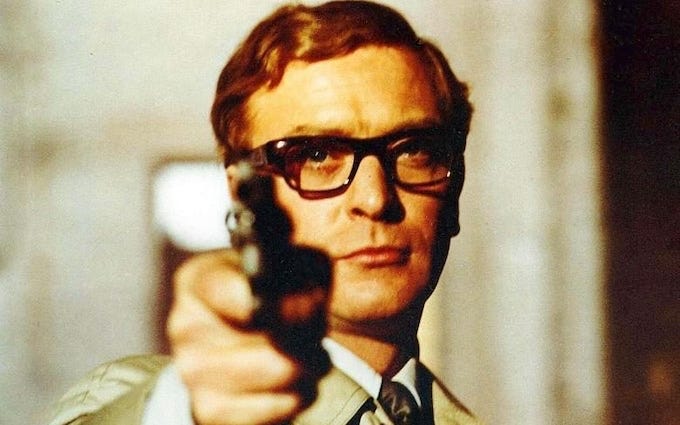
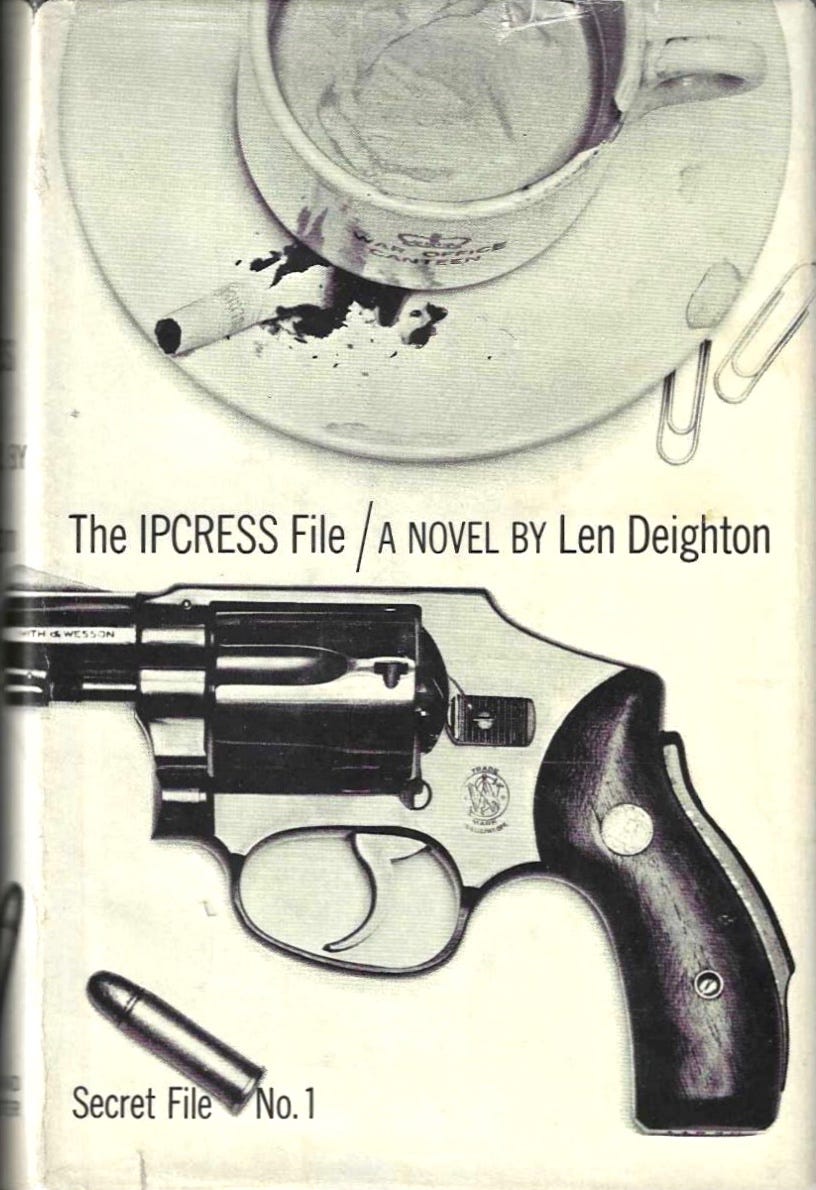
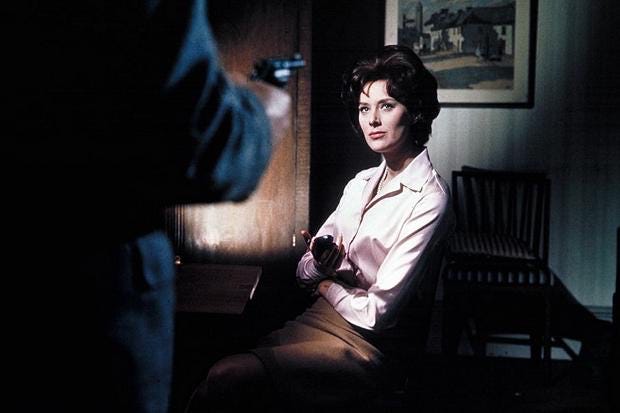
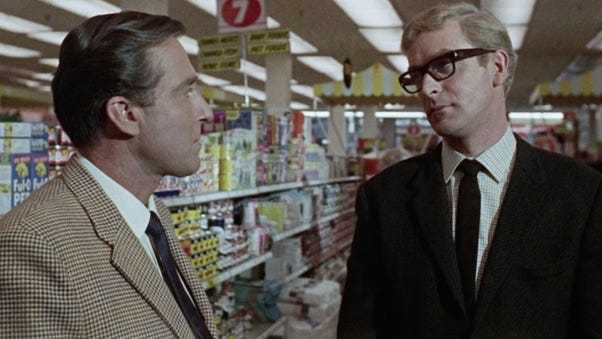

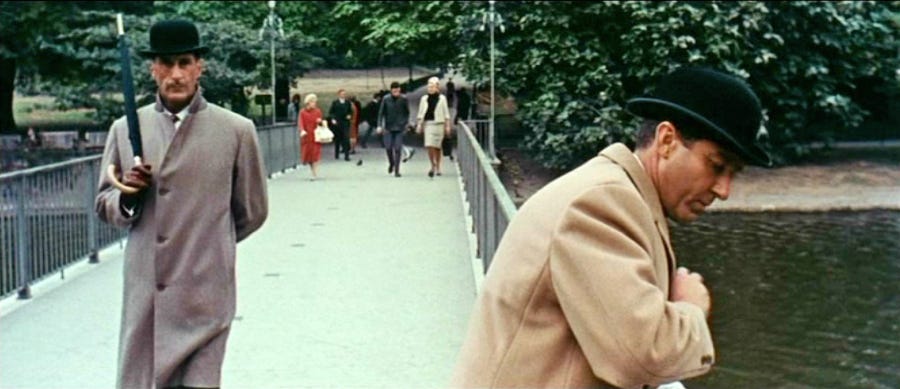
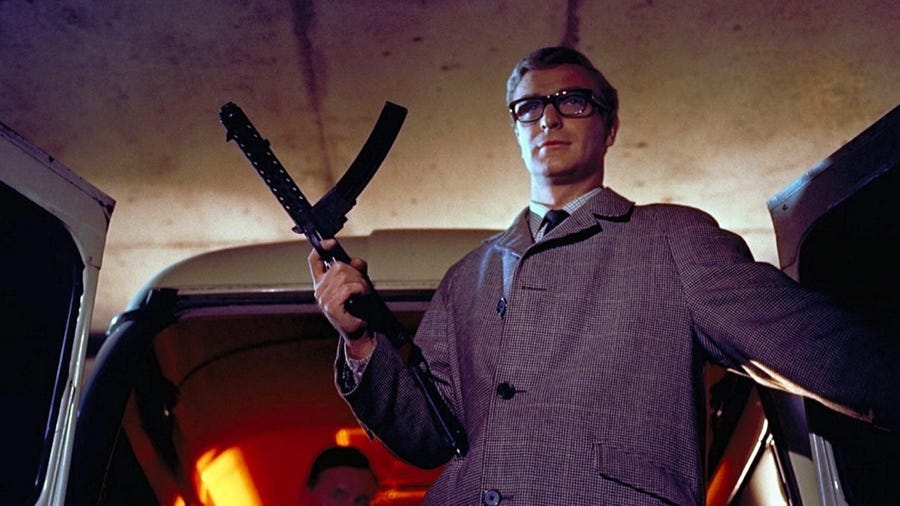
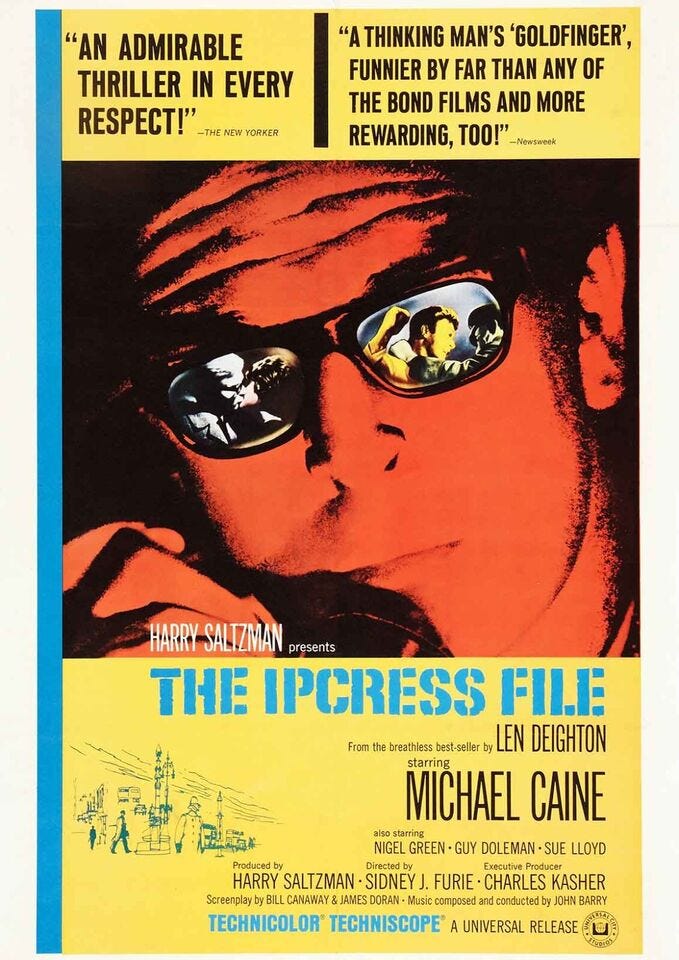
Brilliant and stylist film of an even better and more ground-breaking book.
Interesting you mention Chitty Chitty Bang Bang, which was of course written by Ian Fleming. But the clash of cultures is fascinating. It’s revealing that in Goldfinger (1964) the suave, stylish, enviable James Bond says “My dear girl, there are some things that just aren't done, such as drinking Dom Perignon '53 above the temperature of 38 degrees Fahrenheit. That's just as bad as listening to the Beatles without earmuffs!” That was the same year a third of the population of the United States watched the Fab Four on the Ed Sullivan Show.
Apart from the cooking, isn’t Caine’s Palmer reminiscent of his Alfie? An eye for the birds, and a sense of ‘I’ll do whatever I want to do…and stuff class boundaries’? Or maybe it’s just Caine being Caine…ha-ha?
It’s a terrific film of a fantastic book, and given it almost sinks Bond in some respects, it’s a refreshing view of perhaps the real hackneyed Swinging London.
And Sue Lloyd…who would go onto bigger and better things at the Crossroads Motel with Meg, Sandy, and Benny!
A terrific journey back into the past, Luke, which is better than any Time Machine.